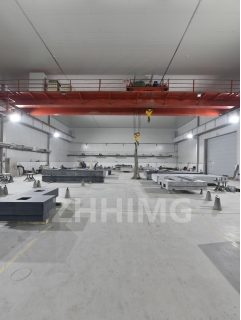Granite is a popular material for precision equipment bases due to its exceptional stability and durability. When precision equipment is mounted on a granite base, it can have a significant positive impact on calibration and alignment.
Granite's inherent properties, such as high density and low thermal expansion, make it an ideal material for providing a stable foundation for precision equipment. When the device is mounted on a granite base, the effects of external vibrations and temperature fluctuations, which are common sources of measurement error, are minimized. This stability ensures that the device remains in a consistent position, allowing for accurate and reliable calibration.
In addition, the flatness and smoothness of granite surfaces play a vital role in the alignment of precision equipment. When the device is mounted on a granite base, it ensures perfect alignment of the components, which is critical to achieving accurate measurements and maintaining the overall performance of the device.
Additionally, the rigidity of granite helps minimize any potential deformation or bending that may occur with other materials, especially under heavy loads. This rigidity is critical to maintaining the structural integrity of the equipment and ensuring it operates within specified tolerances.
Overall, mounting precision equipment on a granite base has a significant impact on calibration and alignment. It provides a stable and reliable foundation that minimizes external influences, ensures precise alignment, and maintains the structural integrity of the device. Therefore, the use of granite bases in precision equipment is a key factor in achieving accurate and consistent measurements in various industries such as manufacturing, metrology, and scientific research.
In summary, the use of granite bases for precision equipment demonstrates the importance of selecting the correct base to maintain accuracy and reliability of the measurement process. Granite’s stability, flatness, and rigidity make it an ideal material for ensuring precise calibration and alignment, ultimately contributing to the overall performance and quality of the equipment.
Post time: May-08-2024

